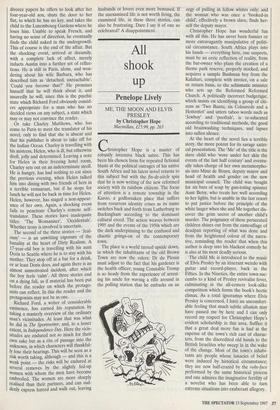All shook up
Penelope Lively
ME, THE MOON AND ELVIS PRESLEY by Christopher Hope Macmillan, £15.99, pp. 263 Christopher Hope is a master of robustly inventive black satire. This has been his chosen form for repeated fictional blasts at the political outrages of his native South Africa and his latest novel returns to this subject but with the fin-de-siecle spin that he is now writing of the new reformed society with its rainbow citizens. The focus of attention is a remote township in the Karoo, a godforsaken place that suffers from recurrent identity crises as its name switches back and forth from Lutherburg to Buckingham according to the dominant cultural creed. The action weaves between 1995 and the events of the 1950s which are the dark underpinning to the confused and chaotic goings-on of the contemporary town.
The place is a world turned upside down, in which the inhabitants of the old Brown Town are now the rulers: Dr du Plessis must adjust to the fact that his gardener is the health officer; young Constable Tromp is so heady from the experience of arrest- ing his uncle for waving a rifle around in the polling station that he embarks on an orgy of pulling in fellow whites only; and the woman who was once a 'booked-in child', effectively a brown slave, finds her- self the deputy mayor.
Christopher Hope has wonderful fun with all this. He has never been funnier or more extravagantly manipulative of politi- cal circumstance. South Africa plays into his hands — everything here, one suspects, must be an eerie reflection of reality, from the bar-owner who plans the creation of a theme park reserve, properly stocked, and acquires a sample Bushman boy from the Kalahari, complete with invoice, on a sale or return basis, to the schismatic minister who sets up the Reformed Reformed Church. A politically incorrect budgerigar, which insists on identifying a group of citi- zens as Two Bantu, six Coloureds and a Hottentot' and utters taboo words such as `Jewboy' and 'pooftah', is re-educated according to traditional methods, the good old brainwashing techniques, and lapses into sullen silence.
At the heart of the novel lies a terrible story, the more potent for its savage satiri- cal presentation. The 'Me' of the title is the slave child who 'wore under her skin the events of the last half century' and eventu- ally takes charge of her own metamorpho- sis into Mimi de Bruyn, deputy mayor and head of health and gender on the new municipal council. The child was bought for six bars of soap by gun-toting spinster Aunt Betsy, who treats her well according to her lights, but is unable in the last resort to put justice before the principle of the white laager when she and Me together dis- cover the grim secret of another child's murder. The poignancy of these persecuted children shines out from the camouflage of deadpan reporting of what was done and from the heightened colour of the narra- tive, reminding the reader that when this author is deep into his blackest comedy he is also at his most deadly serious.
The child Me is introduced to the music of Elvis Presley by an itinerant weirdo with guitar and record-player, back in the Fifties. In the Nineties, the entire town suc- cumbs to a kind of Presley revivalist fever, culminating in the all-corners look-alike competition which forms the book's hectic climax. As a total ignoramus where Elvis Presley is concerned, I have an uncomfort- able feeling that much subtle allusion may have passed me by here and I can only record my respect for Christopher Hope's evident scholarship in this area. Suffice it that a great deal more fun is had at the expense of the town's rich cast of charac- ters, from the discredited old hands to the British Israelites who sweep in in the wake of the change. Most of the town's inhabi- tants are people whose lunacies of belief were induced by historical circumstance; they are now half-crazed by the volte-face performed by the same historical process and one admires the imaginative fertility of a novelist who has been able to turn extreme situations into exuberant allegory.


































































 Previous page
Previous page